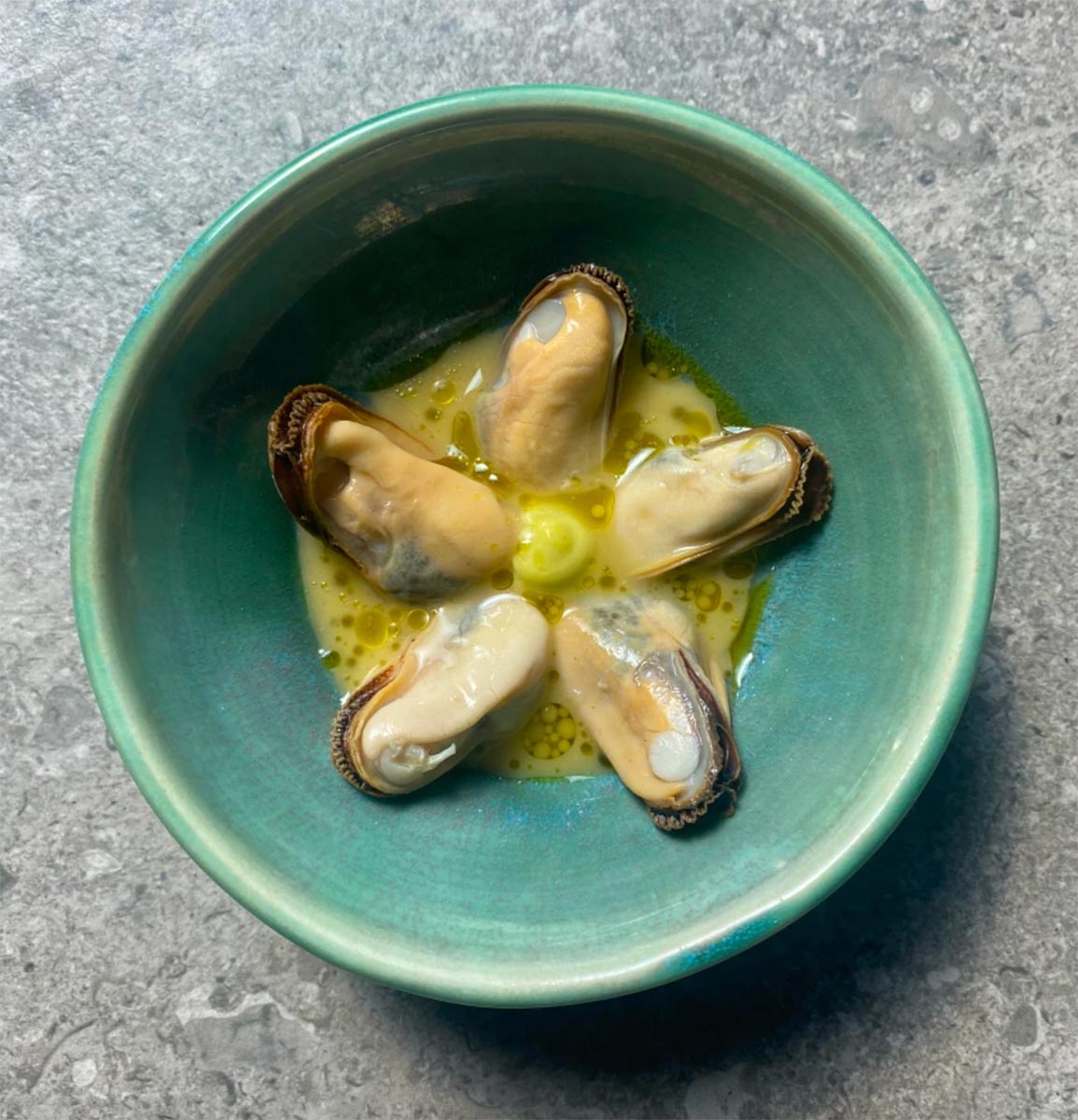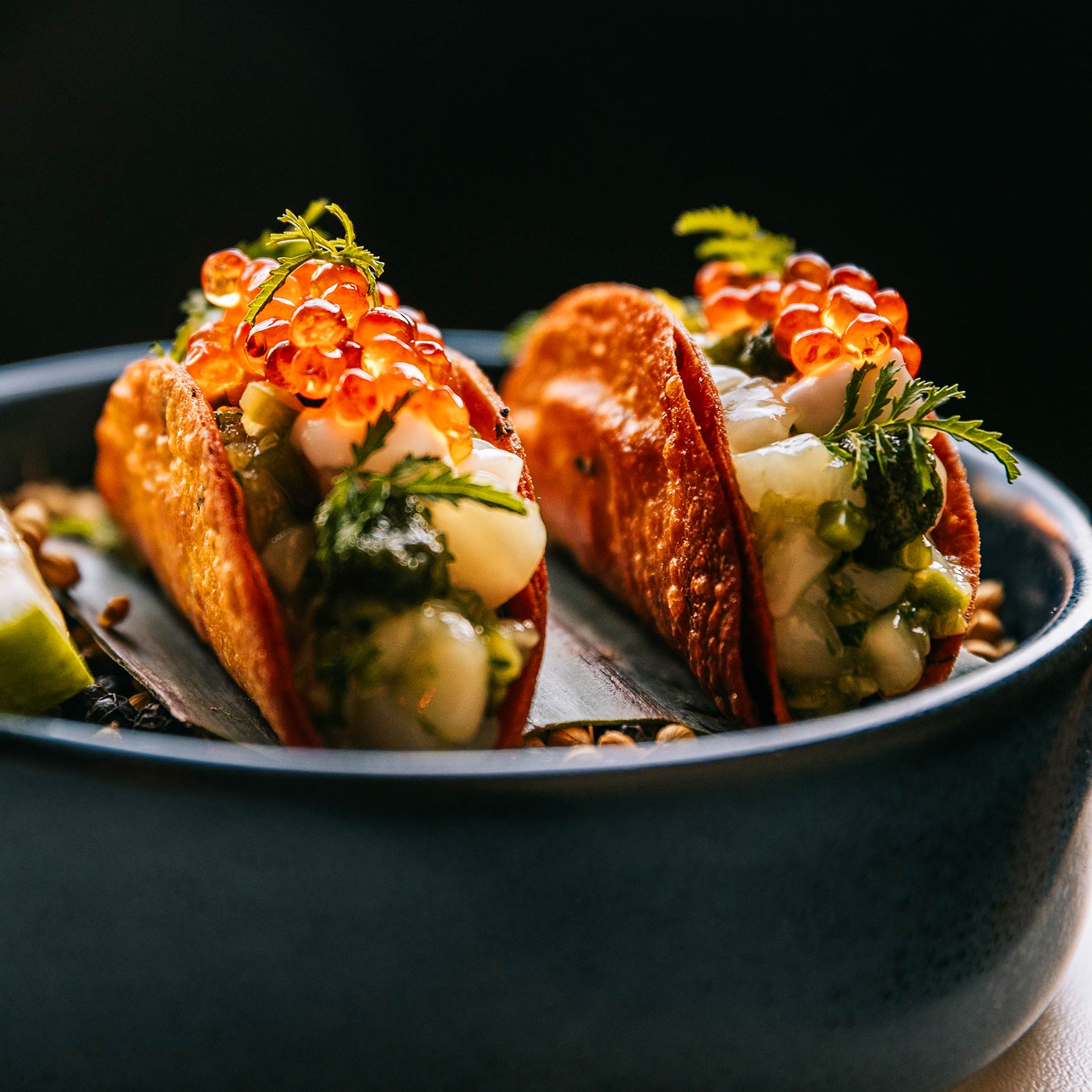“Grace is the beauty of form, under the influence of freedom,” it reads.
When the tattoo moves, it’s like coming face-to-face with Duffy’s perception or the spirit of Grace, his restaurant.
“When I think of Grace, I think about refinement, elegance and beauty,” he explains. “This word describes my food well—it is also what I would like to bring to the table for my guests.”

In it, Duffy’s tumultuous journey as a teenager was meticulously retraced, giving insight into how Grace was born. The producers did all they could to draw out Duffy’s checkered past and at its emotional height, had him unpeeling the raw layers of his being to reveal his deepest wounds. And right there in front of the screen, Duffy breaks down.
In person though, he is soft-spoken, delivering his words carefully, thoughtfully and with intent. In the documentary, he appears larger than life, oozing charm and with the stately presence of a tree: that of solid grounding and an assuring energy that hums quietly and calmly.
His Story
Are those life changing experiences the deciding factor to make him the person he is today?
"It might have been my ‘growing up’ years,” he replies. “The experiences I have been through haven’t been that positive or easy for me. Our family was always struggling to make ends meet, and because of this, I have become so much more appreciative and grateful for what I have today.”
He pauses, “This includes how I was certain that I wanted to be a chef at the age of 14.”
Indeed, while he was born and raised in Columbus, Ohio, Duffy knew at a young age that he had a passion for cooking. His resumé reads like a roll call of some of Chicago’s best restaurants—he started out at Charlie Trotter’s now-defunct eponymous restaurant for three years before leaving for Trio, where he met fellow chef Grant Achatz.

At Grace, Duffy showcases his culinary style, one of elegance and, well, gracefulness. He puts ingredients at the forefront and draws on his wealth of experience in a way that employs technique to enhance flavor.
How Food Changed Him
“Food is to me is my livelihood. If there was one word I can use to describe, it would be… everything,” he says. “It’s the way I challenge myself. I enjoy seeing faces light up with happiness and joy when they eat something good.”
These words carry silent resolve and power.
About a year ago, Duffy had three red stars tattooed onto his right hand. Every time he clasps his hands, the red stars become a focal point.

He laughs at the suggestion. “Yeah… that’s a possibility,” he admits. “But I will not let it happen.”
That’s not to say that rock stars can only be found behind the stoves. At one point during the interview, Duffy mentioned that he wanted to acknowledge and give thanks to his front-of-house staff for presenting his food to diners on his behalf.
“Many times, chefs are busy working in the kitchens, getting the food out. But it is the front of the house who is presenting my food to our guests,” he states. “They have to know my food, how I feel about what I am cooking and what I want to express. More often than not, we missed this point and did not say our thanks.”
Moments like these truly allow you to get an inkling of the man beyond the status of a celebrity chef.
Now at 42 years old, Duffy has amassed more than 20 years of cooking experience, and believes that the trade is something that gets better with age.
“The legendary James Beard once said, before the age of 30, you would not even have what you call, a palate. I find this observation interesting and thought about it for a long time,” he says. “I reflected on my own experiences and I find truth in it. He was right. Before I was 30, I thought I knew, but not so.”
“Eating or tasting food comes with experience. Before the age of 30, you might not have accumulated enough dining or traveling experience to build a bank of flavors at the back of your mind.”
His palate and thought processes are what he counts on to develop his cuisine.
“Nimble thought processes allows one to explore new possibilities. If you think of this process as a muscle, then it is necessary to use it often. Thought processes also embody refinement, so it’s got to be something you do every day, to allow one to approach the new, to improve and progress and to be better than yesterday.”
“This is also something I want to impress upon on the younger chefs—that you might not have inspirations every day, but when we meet with mental blockages, it is important to maintain open mindedness and to accept the situation that the environment presents, it is this that allows one to receive any kind of inspiration.”
Herb Lover
So what, then, is he inspired by?
“The littlest things in life,” he says, as evidenced in his dishes.
Every course is accented by herbs, from the usual suspects like chives and dill, to the less common ones like hyssop and amaranth. On the menu, he has given these botanicals prominence by writing them in caps in the descriptions next to his one-word dish names. Caviar is described simply as, ‘Meyer lemon, brioche, CHIVE,’ while Scallop is explained as ‘coconut, licorice, HYSSOP’.

“When I was a sous chef, I loved seeing people happy because of good food. Then gradually, I fell in love with the creative process of how ingredients became dishes seeing how these dishes would touch diners.”
The definition of Grace on his arm popped up almost instantaneously, as he folds his arms again, to remind you that “Grace is the influence of form, under the influence of freedom.”
As expounded by Duffy himself, his food and his philosophy, Grace is about constant refinement and betterment. It is the work of distilling one’s authentic self from life’s experiences, for the purpose of expressing one’s spirit.
It’s clear then that the man and the restaurant are one. The two are intertwined; Curtis Duffy is Grace, and Grace is Curtis Duffy.






















